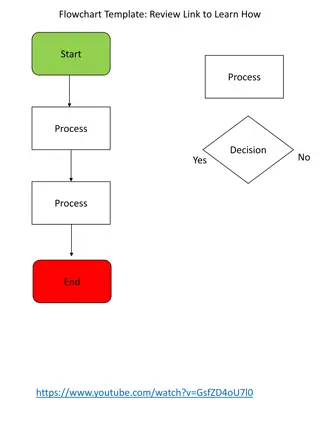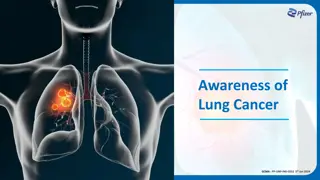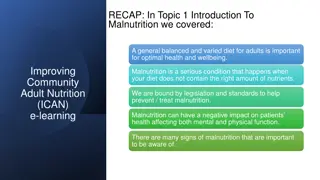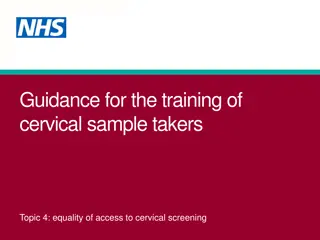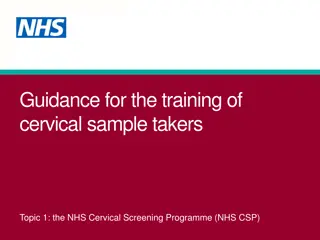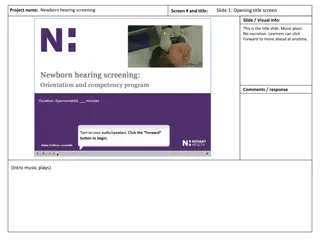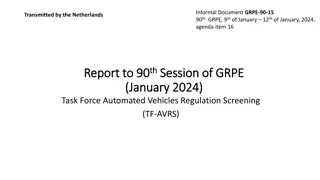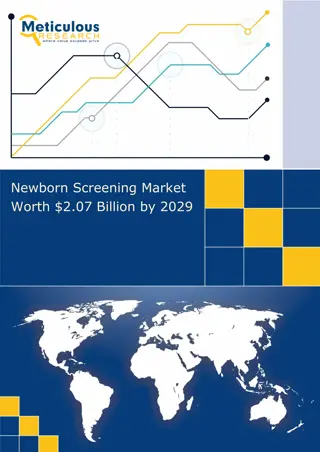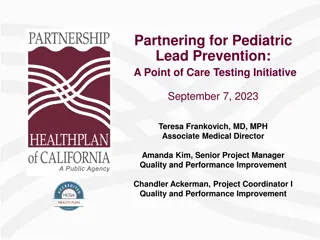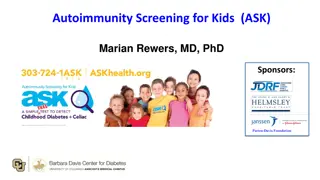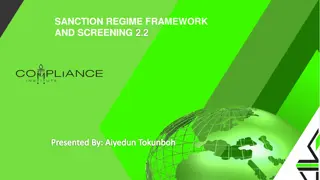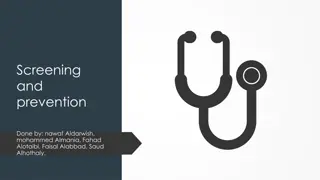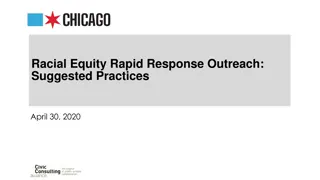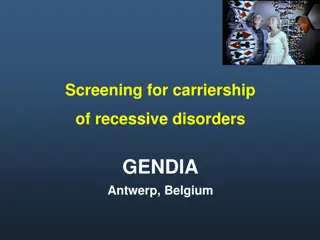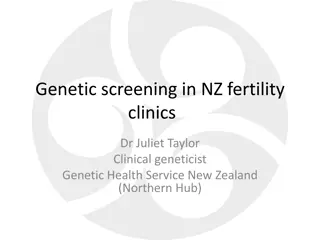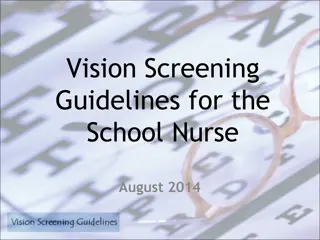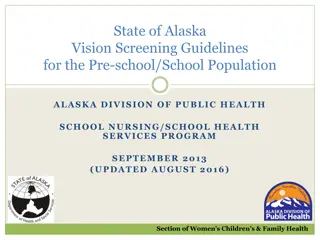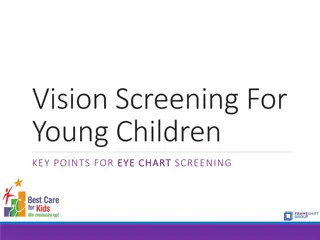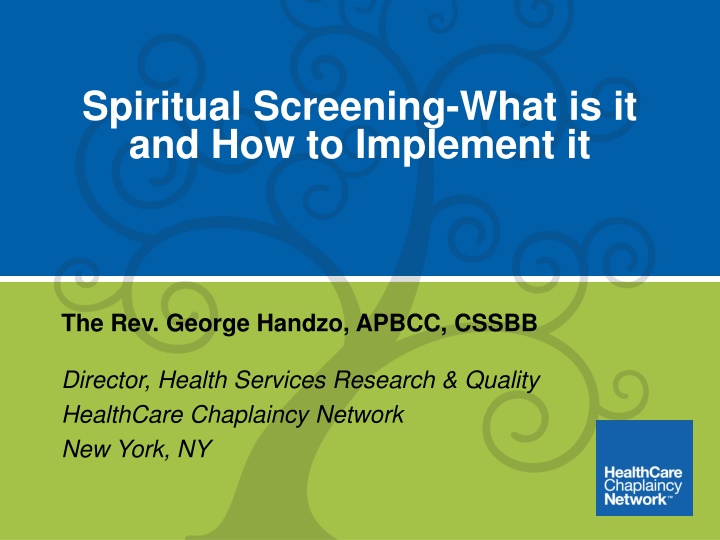
Implementing Spiritual Screening in Health Care Chaplaincy
Learn about the importance of spiritual screening in healthcare chaplaincy, including the process, role of chaplains, and the impact on overall patient care and well-being. Discover how spiritual care specialists support patients, families, and caregivers through their spiritual, emotional, and cultural resources in the healthcare setting.
Uploaded on | 1 Views
Download Presentation

Please find below an Image/Link to download the presentation.
The content on the website is provided AS IS for your information and personal use only. It may not be sold, licensed, or shared on other websites without obtaining consent from the author. If you encounter any issues during the download, it is possible that the publisher has removed the file from their server.
You are allowed to download the files provided on this website for personal or commercial use, subject to the condition that they are used lawfully. All files are the property of their respective owners.
The content on the website is provided AS IS for your information and personal use only. It may not be sold, licensed, or shared on other websites without obtaining consent from the author.
E N D
Presentation Transcript
Spiritual Screening-What is it and How to Implement it The Rev. George Handzo, APBCC, CSSBB Director, Health Services Research & Quality HealthCare Chaplaincy Network New York, NY
Why are We Doing This? See pieces of the puzzle of our clinical exercise Unified picture of why and how we interact with clients Referral, screening, assessment, interventions, documentation, interaction with the team 2
Overview Assumes dedication to whole person care Cicely Saunders- physical, emotional, social, spiritual All equally important There is a specialist for each Chaplains are the spiritual care specialists Anchored in palliative care- NCP guidelines (aka serious Illness) 3
What is the Process? Referrals- triggers-need vs. desire Screening- spiritual distress History- FICA Assessment Documented Plan- taxonomy Re-evaluating Communicating with team- integrating into overall plan Quality improvement- HCPCS codes Massey, K., Barnes, M. J., Villines, D., Goldstein, J. D., Pierson, A. L. H., Scherer, C., ... & Summerfelt, W. T. (2015). What do I do? Developing a taxonomy of chaplaincy activities and interventions for spiritual care in intensive care unit palliative care. BMC palliative care, 14, 1-8. 4
Community Health Care Spiritual Care Emotional Care Chaplaincy Care International Palliative Care Network Lecture Series 2013 Pastoral Care
National Consensus Conference: The Model Generalist/Specialist Model Spiritual care is everyone s job Chaplains are the spiritual care lead Referral practice focused on spiritual distress Screening, History, Assessment, Diagnosis, Plan Puchalski, C., Ferrell, B., Virani, R., Otis-Green, S., Baird, P., Bull, J., ... & Sulmasy, D. (2009). Improving the quality of spiritual care as a dimension of palliative care: the report of the Consensus Conference. Journal of palliative medicine, 12(10), 885-904. 6
Who is the Chaplain? The chaplain is the spiritual care specialist on the health care team. They support patients, families, their caregivers and staff to draw on their spiritual, religious, emotional, and cultural resources, as well as their personal values to cope with their experiences in the health care context. They are unique and essential members of the interdisciplinary team with the goal of providing person-centered care. Handzo G, Buhuro D, Kidd R, Saks N. Ferrell,B. (June 2023)A Statement on the Role and Qualifications of Health Care Chaplains for Research and Quality, J Pain Symptom Mange, 65(6), E745-E755 https://doi.org/10.1016/j.jpainsymman.2023.01.026. 7
Why Spiritual Distress? AKA spiritual struggle, spiritual pain Now demonstrated to be common Large body of literature. 50-65% in cancer patients. This type of distress has been associated with physical and emotional pain and poorer quality of life in longitudinal as well as cross-sectional studies among cancer patients and those with other conditions Spiritual distress impacts medical outcomes and patient satisfaction 8
Spiritual Distress Some r/s struggle was reported by 66%, moderate to high struggle for at least one item was reported by 20% of the patients. In bivariate analyses, r/s struggle was associated with greater symptom burden, greater dignity-related problems and poorer quality of life; in multivariable analyses, dignity-related problems remained a predictor of total r/s struggle. Damen, A., Exline, J., Pargament, K., Yao, Y., Chochinov, H., Emanuel, L., Handzo G, Wilke D & Fitchett, G. (2021). Prevalence, predictors and correlates of religious and spiritual struggles in palliative cancer patients. Journal of Pain and Symptom Management 9
Spiritual Distress Nearly half of the patients/proxies reported some level of spiritual distress (SD). Increasing SD was significantly associated with higher symptom burden (increase of 7 14 points on ESAS) and worse mental well- being (decrease of 2.7 to 4.6 points on PROMIS-10-mental) in adjusted models. Spiritual distress is common in home-base palliative care and is associated with symptom burden and poor mental well-being, but not with hospital utilization. Cipta A, Turner B, Haupt EC, et al.(2021) BMJ Supportive & Palliative Care Epub ahead of print. doi:10.1136/ bmjspcare-2021-003090 10
Protocols With Triggers Serving Need vs. Desire Hard Wiring Deaths Trauma Codes Palliative Care Referrals Disruptive Patient/Family Advance Directives Organ Donation 11
Regulation American College of Surgeons Commission on Cancer (CoC) mandated spiritual screening for all patients in Community Cancer Centers effective January 1, 2015 Spiritual screening sometimes ignored and even when positive, often not referred 12
What is Screening? Sifting Goal- get the big rocks out spiritual distress Find the big issues Has to be done in a timely manner Get the patients who REALLY need the chaplain seen quickly Needs reliable referral system Exception- when chaplain can cover everyone 13
Sensitivity vs Specificity Sensitivity refers to a test's ability to designate an individual with disease as positive. A highly sensitive test over 80% means that fewer cases of disease are missed The specificity of a test is its ability to designate an individual who does not have a disease as negative. High specificity means that there are few false positives You have to balance. Do you want to catch more of the people who have distress which usually means also identifying more negatives as positive or do you want to or miss some positives? 14
Spiritual Screening Options Do you struggle with the loss of meaning and joy in your life? Do you currently have what you would describe as religious or spiritual struggles? (King 2) Are you at peace? Do you have any religious or spiritual concerns? (that you want the chaplain know about?) Not Recommended Do you want to see a chaplain (someone from our spiritual care team)? . 15
Spiritual Screening Question- Rush Protocol Is religion/spirituality important to you as you cope with your illness? (Yes/No) (If yes to #1).How much strength/comfort do you get from your religion/spirituality right now? a. all that I need, b. somewhat less than I need, c. much less than I need, d. none at all) Answers c or d should trigger an automatic referral to chaplaincy (If no to #1) Has there ever been a time when religion and spirituality was important to you? (Yes/No) Yes should trigger an automatic referral to chaplaincy Fitchett, G., Risk, J. L. (2009). Screening for spiritual struggle. Journal of Pastoral Care and Counseling. 62 (1,2), 1-12) 16
Testing Screeners King et al. 87% sensitivity and 44% specificity Labuschagne et al The King 2-question combination showed 71% sensitivity and 63% specificity Reference Standard- Negative Religious Coping subscale vs. Onc-5 Labuschagne, D., Palmer, P.K., Deshields, T. et al. Testing items to screen for religious or spiritual distress in adult outpatient cancer care. Support Care Cancer 33, 198 (2025). https://doi.org/10.1007/s00520-025-09260-9 King S D, Fitchett G, Murphy P E, Pargament K I, Harrison D A, Loggers E T. Determining best methods to screen for religious/spiritual distress. Support Care Cancer. 2017;25(2):471-479 17
Chaplaincy Assessment Categories - NCCN Interpersonal conflict regarding spiritual/religious beliefs and practices. Concerns with lack of meaning/purpose. Struggles with morality/values. Doubts about beliefs. Perception of being attacked by evil. Dealing with issues of forgiveness. Concerns about relationship with the sacred. Concerns about death/dying and/or afterlife. Grief/loss. Feelings of worthlessness of being a burden. Loneliness. Conflict between religious beliefs and recommended treatment. Ritual needs. National Comprehensive Cancer Network Distress Management Guidelines, Version 2, 2022 https://www.nccn.org/professionals/physician_gls/default.aspx. Accessed March 19, 2022. Handzo, G, Bowden, J, King, S. (2019) The Evolution of Spiritual Care in the Distress Management Guidelines, Journal of the National Comprehensive Cancer Network, October, 17(10), 1257-61. 18
Teaching the Team Knowing the evidence Journal of Healthcare Chaplaincy GeriPal Chaplaincy Innovation Lab Transforming Chaplaincy Palliative Care Literature Journal of Pain and Symptom Management 19
The End Game Understanding what spiritual care interventions contribute to positive health outcomes, reduction in the costs of care, and reduction of suffering for patients and family members. Education for all clinicians on spiritual care provision within their scope of practice. Systems to provide best practice spiritual care most effectively and efficiently across the continuum of care. Reimbursement for provision of best practice spiritual care 20
Coming Attractions April 28-30- Caring for the Human Spirit Virtual Conference May 21- Noon ET Spiritual Assessment- The Unique Role of the Chaplain Presenter- Chaplain Burl Cole, D.Min APBCC Spiritual assessment might be the most essential and unique function of the professional health care chaplain. Chaplain Cole recently led a test site for the validation study of the PC-7 assessment tool. He is a CPE educator and Outpatient Pastoral Care Staff Educator at OSF HealthCare Ministry Services. June 18, Noon ET Documentation- How Chaplains Communicate with Staff. Presenter- Chaplain Charles Parker, APBCC, Ed.D, Very often chaplains assess patients well but do not communicate this information clearly to the members of their team in a way that advances patient care. 21
Thank You ghandzo@healthcarechaplaincy.org

